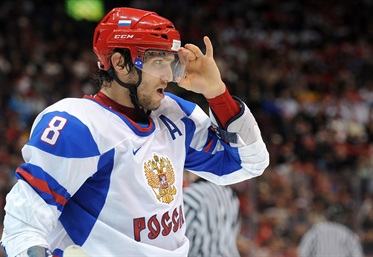Judgement Day for Ovechkin
Judgement Day for Ovechkin
Russian superstar needs home-ice gold more than anyone

 Ovechkin is going into what could be a career-defining tournament for the Russian superstar. Photo: Matthew Manor / HHOF-IIHF Images
Ovechkin is going into what could be a career-defining tournament for the Russian superstar. Photo: Matthew Manor / HHOF-IIHF Images
No hockey player – actually, no athlete – is more closely identified with these Winter Games than the 28-year-old Washington Capitals winger.
As early as 2009, long before NHL participation in Sochi was confirmed, Ovechkin was adamant that he would represent Russia in front of family and friends. “I'll go play in the Olympic Games for my country,” he said. “If somebody says to me, ‘You can't play,’ see ya.” Capitals owner Ted Leonsis even endorsed his superstar’s wish to participate regardless of the circumstances.
So it’s no surprise that the proud Muscovite was not only named an Olympic ambassador, but also became the first Russian to carry the Olympic flame when the record-setting 65,000-kilometre torch relay kicked off in Greece in September.
The world is waiting to see how Ovechkin will carry himself starting on February 13, when Russia opens its quest for Olympic gold against Slovenia. It’s a prize Russia hasn’t claimed since 1992.
Ovechkin is the greatest NHL goal-scorer of the new millennium, and among modern-era NHLers, only Mike Bossy and Mario Lemieux boast better goals-per-game averages at 76.2 and 75.4 respectively.
Likely bound for his fourth Rocket Richard Trophy as the league’s top marksman, he is also a three-time winner of both MVP trophies, the media-voted Hart and the player-voted Ted Lindsay (formerly Lester Pearson). If Ovechkin retired today, he would still be a surefire inductee into the Hockey Hall of Fame in Toronto.
But right now, the focus is on the Olympics.
And Ovechkin, despite faithfully and admirably suiting up for Russia in IIHF competition at least once every year since 2002 (with the exception of 2009), has never played quite as well at either the Olympics or World Championships as he has at his NHL best. Neither his laser shot nor his offensive-zone physicality has been quite as effective.
He has been very good, and is surely destined for the IIHF Hall of Fame. But he is also unquestionably capable of more. Historically, he seems to have squeezed his stick a little tighter when wearing a Russian uniform, perhaps overeager to succeed (His mother Tatiana won two Olympic gold medals in women's basketball with the Soviet Union in 1976 and 1980).
To illustrate, Ovechkin has 13 career NHL hat tricks, but just one at the senior IIHF level, in a 10-1 romp over Kazakhstan at the 2006 Worlds.
The two-time World Champion peaked in that tournament with six goals and six assists in Quebec City 2008. There, Dany Heatley – an outstanding international forward for Canada with an all-time nation-best 69 career points, but not in Ovechkin’s class – had 12 goals and eight assists.
Ovechkin had the joy of scoring the 2-0 winning goal against the archrival Canadians in the 2006 Olympics in Turin, where he finished with five tallies and was named a tournament all-star. But he was blanked along with his teammates in the semi-finals against Finland (4-0) and the bronze medal game against the Czech Republic (3-0).
More crushingly yet, Ovechkin was held off the scoresheet in the dramatic 7-3 quarter-final loss to Canada at the 2010 Olympics in Vancouver. He desperately wanted to defeat the motherland of hockey on its own ice, but instead, he was part of arguably the worst moment in Russian Olympic history.
Did that nightmarish episode have a far-reaching effect on his ability to perform?
In a 2011 ESPN interview, Ovechkin stated: “I never look forward. I live for today. And if you think about what's going to happen in a year, in two years, then you begin to plan. And plans never come true.”
Yet in practice, it seemed as if after Vancouver, Ovechkin was both haunted by that failure and distracted by the future promise of Sochi, unable to bear down on his chances.
To complete the 2009-10 NHL season, he scored eight goals in 18 games. He finished with 50 goals, but over that final stretch, his pace was that of a 36-goal scorer. For the next two seasons, he stayed stuck in second gear, potting 32 and 38 goals respectively.
Only during last year’s lockout-shortened campaign – with the 2014 Games looming – did he regain his old vitality. After Christmas, Ovechkin slowed down a little bit, partly due to injuries. But he's begun to surge again and he's still gunning for 50 goals, despite being far behind archrival Sidney Crosby in the overall scoring race.
Objectively, Washington may not even make the playoffs this year, let alone contend for the Stanley Cup against the likes of Chicago, Anaheim, Boston, or Pittsburgh. Winning a Cup en route to the IIHF Triple Gold Club could be Ovechkin’s biggest challenge in the long haul.
The 2014 Olympics are likely Ovechkin’s single greatest chance to silence his critics with an outing for the ages. At 28, he is still in his prime, which he will no longer be if he makes it to South Korea for the 2018 tournament.
Playing a leading role in a home-ice Olympic victory would seal his hockey legend. Just ask Crosby, who was not dominant in Vancouver, but picked the perfect time to score an overtime winner: in the gold medal game against the United States.
The weight of expectations does not fall solely on Ovechkin, of course. Yevgeni Malkin and Pavel Datsyuk must be at their best, along with KHL returnees like Ilya Kovalchuk and Alexander Radulov. Starting goalie Semyon Varlamov will be under the microscope.
But Ovechkin is a showman, and the Olympic Games – with apologies to the Barnum & Bailey Circus – are truly the Greatest Show on Earth. Now is the time for him to claim the spotlight.
Back to Overview











































